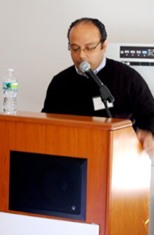Carlos Decena's new book provides insights into the immigrant gay experience, and in particular, self-disclosure
New York City has long been a beacon for gays and lesbians. Its diversity, liberal politics, and thriving, multifaceted queer culture are a powerful lure to self-seekers from across the globe.
But as Rutgers professor Carlos Ulises Decena demonstrates in his pioneering new book, Tacit Subjects: Belonging and Same-Sex Desire among Dominican Immigrant Men (Duke University Press 2011), the lives of gay New Yorkers do not all hew to a single, overarching narrative of sexual freedom.
The gay men Decena interviewed for his book live and often work in the Dominican enclave of Washington Heights in upper Manhattan, and are neither fully in nor out of the closet. Same-sex relationships are just one of the opportunities they seek as immigrants, he notes, and they carefully manage personal information within their community lest it compromise other vital pursuits, including economic and social advancement.
"Coming to New York is not just about migrating and being liberated. Many of these men continue to be embedded in a Dominican world. The move expands their opportunities, but doesn't rupture community ties," explains Decena, an assistant professor of Women’s and Gender Studies, and Latino and Hispanic Caribbean Studies in the School of Arts and Sciences. "They continue to be connected to the community because they can't afford not to be. It's about survival."
While openly declaring they're gay might hurt their prospects, most of the men he interviewed told Decena

"Just because they don't say something doesn't mean they're silent. Doing may be saying," he notes, adding that many of the men did not view themselves as closeted.
Decena, a first-generation gay Dominican, describes his coming-out as comparatively more "American." It induced some tears at first, but no rupture with his family. His comfort level reflects in part his social status as an Ivy League graduate with a Ph.D. and a blossoming academic career.
Indeed, the role that class plays in guiding negotiations of "the blurry lines separating what is tacit from that which is expressed explicitly" is a theme Decena explores in the book. He notes, for example, that within his sample, light-skinned men – often middle or upper-class Dominicans – were given more leeway to express femininity than were darker-skinned men.
But it was the liberal, largely white gay community's reaction to the Dominicans and other Latino gay men that initially sparked his interest in them.
While attending graduate school at New York University and conducting research on public health issues, including AIDS, he discovered that the mainstream gay community viewed these men critically for being closeted, while also suspecting they did not practice safe sex as a result. He was living at the time with a group of gay Dominicans, some of whom he interviewed for the book.
"I realized how often Latino men are vilified in the HIV community for failing to come out. My answer to that is that it is not dishonest to deal with complexity, and there are very different ideas about what being 'out' means," he said."The liberal white model – of pride, outspokenness, and visibility – has becomes the normative one, but it's not the only one."
Decena said his insights into the immigrant gay experience, and particularly self-disclosure, were also influenced by his work at Rutgers in the Department of Women's and Gender Studies.
"Gay is not all these men are. They wrestle with a lot. They're immigrants, some of them undocumented. And they are very mindful of the pecking order and invested in whatever power and privilege they can access, and some of that is male privileged. These are men – and that matters to them."